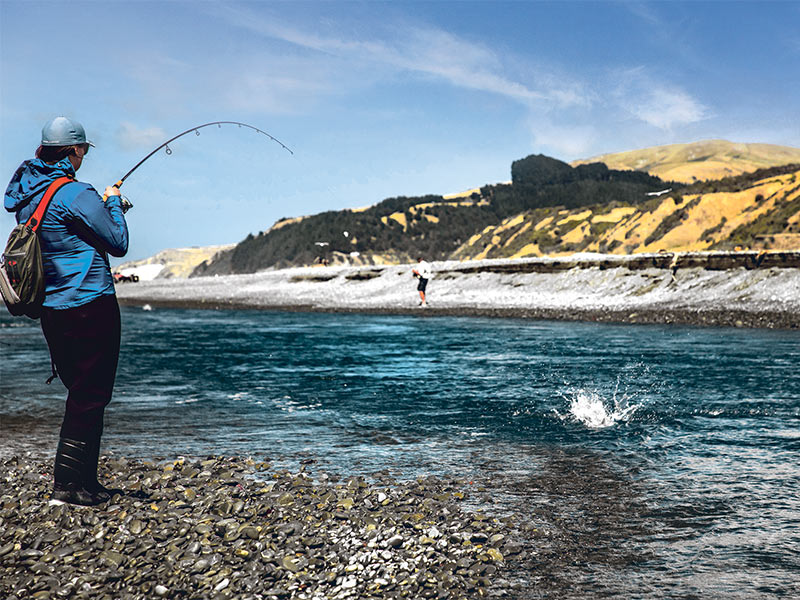Changes recommended to proposed environment bill
5 min read
Three laws will replace the Resource Management Act. Photo: Fish & Game
Fish & Game NZ is cautiously welcoming recommended changes to the proposed law to replace the Resource Management Act (RMA).
The organisation said that while the reforms may be a boost to the future of freshwater fishing and game bird hunting, questions still remain over parts of the legislation.
In place of the RMA will be three laws: the Natural and Built Environment Bill, the Spatial Planning Bill, and the Climate Adaptation Bill.
The Natural and Built Environment Bill aims to create a new legislative framework for how New Zealand manages its natural environment, including freshwater, biodiversity, and resources.
Minister for the environment David Parker said the new bills to replace the Resource Management Act will streamline environmental oversight.
Select Committee recommends changes

Parliament’s Environment Select Committee recommended the Government enshrine the protection of the habitat of trout and salmon alongside the protection of indigenous species in the Natural and Built Environment Act.
The select committee also recognised the values Kiwis place on public access to lakes and rivers and recreational use and enjoyment of the natural environment. It has called for these values to be maintained and enhanced.
Trout were introduced to New Zealand in the 1860s and have since spread throughout the country’s waterways. The species is seen as a harmful invader of waterways by some and a prized catch by others.
Fish & Game New Zealand chief executive Corina Jordan said the select committee’s suggestions were a win for recreation, anglers and hunters, and a win for all New Zealanders.
“The initial draft of the NBEA completely ignored the value Kiwis place on recreation and enjoyment of our great outdoors and removed the habitat protection of trout and salmon so these recommended changes are positive for Fish & Game, our licence-holders, and Kiwis,” she said.
Jordan said the inclusion of trout and salmon habitat protection in the new law is vitally important because it has long been recognised that these species require a healthy freshwater environment to be able to survive and thrive.
“They are not only nationally important due to their recreational value and for food harvest, but they also act as our canary in the coal mine,” she said.
“Trout and salmon have some of the highest freshwater quality and quantity requirements out of our freshwater species. By safeguarding their habitats, we also protect the habitats of all other species.
“This has enabled Fish & Game to argue for water quality and quantity standards that have protected not just the species under our jurisdiction, but all freshwater species.
“We have always been clear that any law must recognise both the national importance of these species and the reason why we need to protect their habitats – to safeguard the habitat of all freshwater fish. On the face of it, these changes go a long way to addressing those concerns.”
Initial proposal concerning for recreationists

Fish & Game said the initial proposed law heralded a major challenge to the future of freshwater fishing and game bird hunting.
It said the Bill ignored the value all New Zealanders placed on recreation and enjoyment of the outdoors. The Bill also removed the habitat protection of trout and salmon, which the RMA long safeguarded.
Jordan said there had been widespread concern about the Bill from both environmental and industry groups as well as mana whenua.
“Ultimately, we believe these reforms will fundamentally strip Fish & Game’s ability to carry out our statutory duty to provide for the interests of anglers and hunters and to ensure freshwater habitats, including wetlands, are healthy and support trout, salmon and game bird populations,” she said.
Jordan said Fish & Game were not satisfied with reassurances from the Government and the environment minister that anglers and hunters had nothing to fear.
“We believe the Government’s reform of the RMA represents the thin edge of the wedge and will likely usher in further law changes threatening the future of hunting and fishing, the species we harvest for food, and our critical role in managing these species and their habitats on behalf of New Zealanders.”
Over the past 12 months, Fish & Game had raised its concerns about the RMA reforms with environmental NGOs, officials, MPs from all political parties and ministers.
The organisation launched an online campaign, Our Future, which encouraged anglers, hunters and New Zealanders who enjoy the great outdoors to send their concerns about the Bill directly to the Government and Members of Parliament.
Almost 12,000 people visited the Our Future website and nearly 3500 sent emails outlining their concerns to the Government and MPs.
Jordan said there were still areas in the reforms that needed to be addressed and said the Bill should be more consistent with the National Policy Statement on Freshwater Management.
“The proposed law needs to be more explicit, in particular by ensuring the habitat of trout and salmon is protected, insofar as this is consistent with the protection of the habitats of indigenous freshwater species.
“We remain concerned about the limits framework where the Government and local government will set environmental bottom lines for the environment, along with the ability for New Zealanders to have their voices heard in the development of new Regional Planning frameworks and consents.”
Jordan added that Fish & Game also wants recognition for the angling values for freshwater and a provision for meaningful participation for hunters, anglers, and those that enjoy the outdoors in shaping how the natural environment is managed at a regional and catchment level.
“We can strive for ecological health outcomes, recognising that people are part of the environment.”
Government response
Meanwhile, environment minister David Parker welcomed the Environment Select Committee’s report on the reform laws.
Around 3000 submissions were received with 94% of all submitters agreeing on the need for system reform.
“The reform will establish a more efficient, less costly system that allows the housing and infrastructure we need for our communities to thrive, without depleting our natural resources and degrading the state of our environment,” Parker said.
“The RMA takes too long, costs too much, and does not adequately protect the environment. It’s time to repeal it.”
National’s Hunting and Fishing spokesperson Todd McClay said the National party will repeal the Natural and Built Environment Bill.
“Labour’s changes to the RMA will water down the protection of trout and salmon habitats unnecessarily, undermining this important Kiwi recreational activity.
“Labour’s RMA changes will jeopardise this. While the select committee has tried to repair the damage of Labour’s changes, this draft law does not go far enough, and trout and salmon fishing remains under threat.
“National recognises that trout fishers are conservationists at heart. We need to ensure that future generations can enjoy these activities by striking the right balance between conservation and recreation.”



